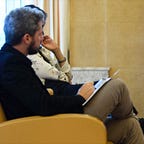The invasion of Iraq awakened an anti-war movement the likes of which had not been seen since the Vietnam War
George Bush’s ‘Operation Iraqi Freedom’ launched a new protest movement
“I don’t think there is a snowball’s chance in hell this march will stop the war,” a British student protester said, “but it’s going to send out a message to next time, maybe.” It was March of 2003 and the U.S. had just begun its war in Iraq, which brought protesters into the streets of London, Berlin, and New York, among many other cities. There were chants of “Bush, murderer” and signs reading “No blood for oil.” Hundreds of thousands gathered in public squares and outside U.S. military bases, embassies, and consulates all around the world.
“Operation Iraqi Freedom” was officially launched on March 19 of that year by George W. Bush, alongside the so-called Coalition of the Willing, a group of nearly 50 countries supporting the U.S. plan to invade Iraq and remove President Saddam Hussein from power. Skepticism around Bush’s claims that Hussein had weapons of mass destruction and wariness of engaging in yet another war fueled the protests. Public outrage preceding the invasion grew steadily over several months, culminating one month before the invasion, when a massive rally brought together more than three million protesters in Rome, in what was the largest anti-war rally ever.
Protests continued once the war had begun. On March 22, an estimated 100,000 marched in Madrid, clashing violently with local police. Roughly one million protested in London, calling for pro–Iraq war prime ministers to resign. “It is important to have a European response to a country that just does anything it wants,” said economics professor Javier Velazquez while marching in Madrid.
In Rome, the city’s ancient monuments were draped with peace flags, and 650,000 protesters, including politicians, film stars, Catholic Church representatives, human rights groups, and Iraqi exiles marched to Bruce Springsteen songs.
A student at a march in Finland said, “People ask what’s the use of this, but our task is to instill faith in people and try and prevent anything like this happening again.” In the U.S., protests were also held against media outlets. In Los Angeles, the day before the Academy Awards, thousands of protesters chanted: “CNN and NBC, put the peace march on TV.” They carried signs reading “CNN — Weapons of mass deception” and “CNN — Censorship Cable Network.”
Though the mass rallies couldn’t stop the U.S. invasion, they awakened an anti-war movement the likes of which had not been seen since the Vietnam War.
At Timeline, we reveal the forces that shaped America’s past and present. Our team and the Timeline community are scouring archives for the most visually arresting and socially important stories, and using them to explain how we got to now. To help us tell more stories, please consider becoming a Timeline member.
